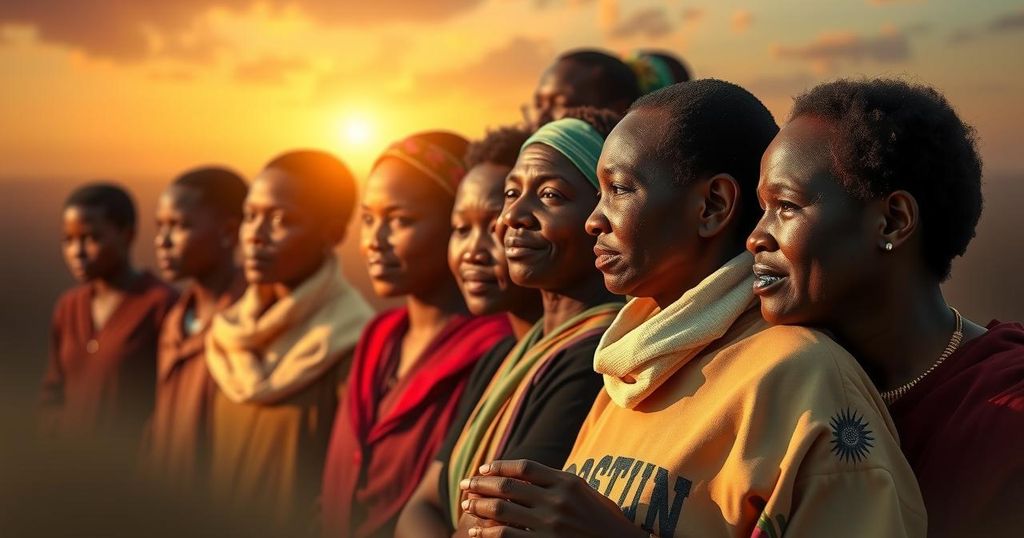As South Sudan approaches 2025, there is a strong call for collective efforts towards peace and unity following years of conflict. The author highlights the importance of justice, inclusion of women and youth in peacebuilding, and investments in infrastructure and governance to create a conducive environment for lasting harmony. The call for collaboration between various societal factions and international partners underscores the collective responsibility of all citizens for the nation’s future.
As we enter 2025, I convey my warmest New Year greetings to all citizens of South Sudan, both those residing within our borders and those living abroad. This forthcoming year symbolizes a beacon of hope, rejuvenation, and collective determination. It is our opportunity to transform the narrative of our nation, focusing on the essential elements of trust, reconciliation, and establishing a sustainable foundation for enduring peace and prosperity.
Peace transcends mere absence of warfare; it serves as a crucial driver of societal growth, fairness, and equality. Our nation has grappled with the burdens of conflict and fragmentation for too long. The memories of our tumultuous past reinforce the urgency for a committed embrace of peace. In 2025, it will be imperative that we undertake concerted efforts to mend our nation, embedding a shared aspiration for a fruitful future.
Unity lies at the heart of advancement. While our diversity is potent, it necessitates collective strength to harness its full capabilities. The ethnic and political rifts that have perennially impeded progress must be confronted. The year 2025 offers a vital opportunity to transcend these divisions, cultivating a national identity grounded in respect, shared objectives, and communal ambition. Unity is not merely an aspiration; it constitutes the bedrock for a peaceful and thriving South Sudan.
The youth of South Sudan embody the vibrant core of our society, teeming with innovation and potential. They stand not just as future leaders but also as current catalysts for change. In 2025, we must empower our young people to emerge as advocates for peace, spearheading grassroots discussions, fostering reconciliation, and promoting community-driven initiatives. Their vitality and creativity are indispensable to achieving enduring peace and sustainable growth.
Women represent a pivotal component in South Sudan’s social fabric, playing an invaluable role in peacebuilding. Their determination, insight, and capability to promote dialogues render them essential in the quest for long-lasting unity. In 2025, it is crucial to ensure full female participation in decision-making processes at all levels, as their input is vital for constructing an equitable and inclusive society.
Confronting past grievances is critical to our forward momentum. Justice and reconciliation should be viewed not as opposing forces, but rather as complementary elements of healing. By instituting a national truth and reconciliation initiative, we can create an avenue for both victims and perpetrator to address the past and cultivate understanding. Concurrently, ensuring accountability for historical injustices will solidify the rule of law, providing a groundwork for an equitable and tranquil future.
Investing in peace equates to acknowledging the importance of infrastructure, education, and health care as critical components for social and economic development. Enriching governance through transparency, accountability, and adherence to the law will enhance public confidence and forge an environment conducive to peaceful coexistence. The development of our nation hinges on these essential investments that bridge societal gaps.
The South Sudanese diaspora and international allies play a fundamental role in our peacebuilding journey. The diaspora can offer resources, expertise, and advocacy to support our efforts, while international partners can provide technical aid and financial backing for peace initiatives. Collaborative efforts across borders will strengthen local endeavors and ensure the sustainability of our peace agenda.
The responsibility of fostering peace does not rest solely on the government; it is a duty that encompasses every one of us. Religious leaders, community elders, youth, women, and civil society must collaboratively champion peace at all societal levels. As we welcome 2025, let us commit to ensuring that every decision, action, and dialogue embodies our steadfast dedication to unity and reconciliation.
Proclaiming 2025 as the Year of Peace and Renewal represents not just a symbolic gesture, but a rallying call. This designation opens a pathway to cultivate a society where our children grow up free from fear, communities flourish in harmony, and prosperity is experienced by all. Together, we have the potential to transform challenges into opportunities, crafting a future where peace is a lasting reality rather than a fleeting aspiration. As we embark on this pivotal journey, let us prioritize unity and steadfastly work towards our shared vision of a better South Sudan. May 2025 be the year we convert hope into tangible action and establish peace as a lasting legacy.
This article addresses the aspirations and challenges facing South Sudan as it enters the year 2025. It emphasizes the need for peace, unity, and reconciliation in a nation plagued by conflict and division. The author highlights the critical roles of youth and women in the peacebuilding process and underscores the importance of addressing past injustices as a pathway to healing. Furthermore, the author calls for collaborative efforts from various segments of society, including the diaspora and international supporters, to create a sustainable and effective peace agenda.
In conclusion, the author calls for collective action towards peace and unity in South Sudan in 2025. Rebuilding trust, fostering reconciliation, and empowering all societal segments, particularly youth and women, are imperative for lasting peace. The responsibility lies with the entire community, and a collaborative approach is necessary to ensure that the aspirations for a harmonious South Sudan materialize. The vision for the upcoming year is not merely symbolic but serves as an actionable framework to convert hope into reality.
Original Source: www.radiotamazuj.org






